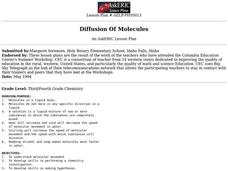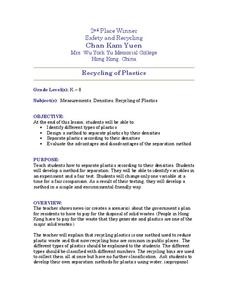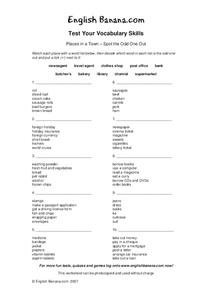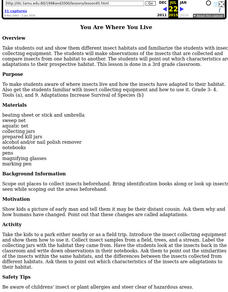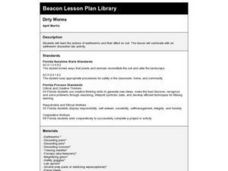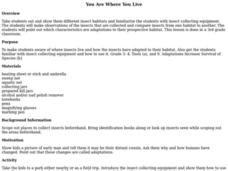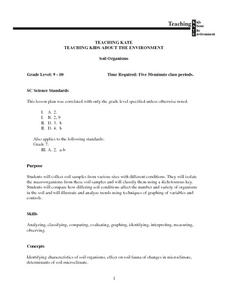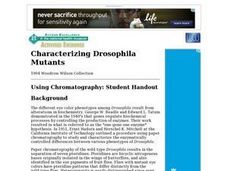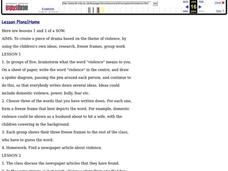Curated OER
Diffusion Of Molecules
Students investigate molecular movement while studying how to perform a chemistry investigation.
Curated OER
How Clean Is Our Water?
Students examine samples of water to determine its cleanliness. They visit a waste treatment plant and/or reservoir. Students explore what protects the water supply from contamination by chemical or organize pollution. They trace the...
Curated OER
Protection and Compassion
Students investigate ways to protect themselves against AIDS while learning compassion for the those with the disease. In this HIV/AIDs lesson, students discuss ways to protect themselves against contacting the disease. Students discuss...
Curated OER
How Can We Extract Human DNA?
High schoolers perform an experiment in which they extract DNA samples from hair samples. They follow a set procedure to extract the DNA and complete summary questions.
Curated OER
Up, Up and Away
Third graders are presented with the problem of: Do all liquids evaporate at the same rate? The lesson contains adequate background information for the teacher. They participate in a lab experiment in order to test the scientific...
Curated OER
Recycling of Plastics
Students separate plastics according to their densities, develop a method for separation and identify variables in an experiment and a fair test, changing only one variable at a time for a fair comparison. After testing, they develop a...
Curated OER
Cells, The Structural and Functional Units of Life
Students observe the general structure and organelles of plant and animal cells. Students prepare microscope slides of elodea, onion, check, and cork and identify the cells by size and shape as unicellular, multicellular, plant or animal.
Curated OER
ESL: Words with "D"
In this ESL words with "d" worksheet, students fill in blanks in sentences, choosing the correct "d" word from a drop down list. Page has links to additional activities.
Curated OER
Places in a Town - Spot the Odd One Out
In this vocabulary worksheet, learners match each place with a word list and decide which word in the list is the odd one out. Students complete 10 exercises.
Curated OER
Making Embryo Sets
Young scholars preserve embryos to study embryonic development from day 3 through 21.
Curated OER
You Are Where You Live
Students explore where insects live and how they have adapted to their environment.
Curated OER
Dirty Worms
Students examine the functions of earthworms and their effect on soil. They conduct an earthworm dissection lab, and complete a checklist.
Curated OER
Keith Haring: Art Representing Social Issues
Students discuss Keith Haring posters that were created to represent different social issues. They, in groups, create a poster that represents a social issue that affects their lives.
Curated OER
Pregnancy, Day 2
Students listen to explanations of what can go wrong in pregnancy and why problems arise. They complete worksheets and define terminology.
Curated OER
You Are Where You Live
Third graders observe insects in a number of habitats. They recognize which insect characteristics are adaptations to their habitats.
Curated OER
Soil Organisms
Students work together to collect soil samples from different locations. In the samples, they identify the macroorganisms and classify them. They identify the conditions that affect how macroorganisms grow. They also analyze and identify...
Curated OER
Characterizing Drosophila Mutants
Students investigate wild-type and several mutant varieties of Drosophila melanogaster, which are characterized and distinguished according to pteridine pigments. They discoverthat paper chromatography of the wild-type Drosophila results...
Curated OER
Selecting Soil Organisms in Compost
Students conduct an experiment to demonstrate that many of the enzyme systems needed to break down society's wastes exist in nature among the decomposers in a compost pile. They culture compost bacteria on starch agar to examine the...
Curated OER
Selecting Soil Organisms in Compost
Learners demonstrate that many of the enzyme systems needed to break down--and therefore clean up-society's wastes already exist in nature among the decomposers. They select the best starch-munching organisms by altering the environment...
Curated OER
Let it Grow and See What Happens
Middle schoolers participate in an experiment in which they try to stop algae from growing. In groups, they develop a hypothesis and test it while making changes to the experiment along the way. They make observations and organize...
Curated OER
Food: Habits and Holidays
In this foods of the world worksheet, students answer true and false questions about their own eating habits, than complete a matching activity where they match foods with countries of the world.
Curated OER
Build Your Own Weather Station
Studens experiment with temperatures. In this science lesson, students make their own weather station by heating one bottle and keeping the water in another bottle at room temperature.
Curated OER
Violence
Students create a drama based on the theme 'violence'. Students then find newspaper articles that depict violence and share them with the class.
Curated OER
What Increases the Risk of Cardiovascular Disease?
Students analyze the risk factors for cardiovascular disease and classify them according to whether or not they are controllable. They discover how to reduce the probability of high blood pressure through diet and exercise.


